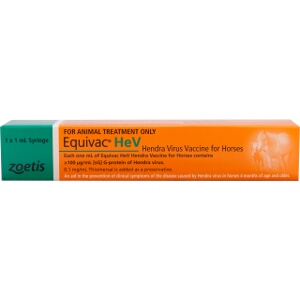Equivac® HeV

![]()
Transparent Pricing
![]()
Simple Ordering
![]()
Expert Advice
Australian veterinarians can now purchase our full range of products directly from Zoetis.
Zoetis Direct is a business-to-business initiative. Zoetis does not supply products directly to the general public.
VIDEO: OVERVIEW OF ZOETIS DIRECT
Zoetis Direct evolves the way we deliver value to you, your clinic and importantly to your patients. You will enjoy transparent pricing, a simple ordering system, seamless delivery and easy access to expert advice through our direct distribution commitment.
Zoetis Home / Products / Equivac® HeV

Description:
Recommendations for use:
Pack sizes:
Dosage:
Summary of Dosing Schedule
|
Vaccination Type |
Timing Interval |
|
First Dose |
Day 1 |
|
Second Dose |
Day 21 - 42 |
|
Third Dose |
6 months after the second dose |
|
Followed by 12 monthly boosters |
|
Storage:
Store between 2°C and 8°C (Refrigerate. Do not freeze). Protect from light.
Human Safety
Additional user safety
Take care to avoid accidental self-injection. Accidental self-administration may result in local bruising, pain and swelling. In the event of self- administration, seek medical attention and show the package leaflet or the label, to the Medical Practitioner.
This material may cause a mild allergic reaction in sensitive individuals on skin contact. Avoid skin contact. If skin or hair contact occurs, remove contaminated clothing and flush skin and hair with running water. If splashed in eyes, wash out immediately with water.
Personal Protective Equipment (PPE) should be worn whenever Hendra virus disease is suspected even in vaccinated horses as not all vaccines can provide a guaranteed protection.
First Aid Statement
If poisoning occurs, contact a doctor or Poisons Information Centre. Phone Australia 131126.
Registered label warnings
Withholding Periods
MEAT Withholding Period: Not Applicable
ESI
ESI not applicable
Contraindications
The product should not be used in sick or immunocompromised horses.
Side Effects
Transient swelling may develop at the site of vaccination in some horses but should resolve within one week without treatment.
In some horses transient post vaccination reactions including injection site reaction, pain, increase in body temperature, lethargy, inappetence, and muscle stiffness have also been observed. Additional reported clinical signs have included urticaria, sweating, oedema and colic. Clinical signs may vary in severity and occasionally may require veterinary intervention.
Systemic allergic reactions such as anaphylaxis may require parental treatment with adrenaline, corticosteroid and antihistamine as appropriate and should be followed by appropriate supportive therapy.
Precautions
The effectiveness of Equivac HeV vaccine in the face of Hendra virus disease outbreak has not been studied.
While all horses receiving the recommended vaccine course and booster vaccination at 6 months were antibody positive, the potential for vaccinated horses to shed virus if exposed to and infected with the Hendra virus cannot be ruled out.
It is recommended that good hygiene practices are observed when horses are being handled.
This product has been found to be safe for administration to pregnant mares. However, in pregnant mares it is important to avoid the use of vaccines during critical stages of pregnancy. For this reason avoid vaccinating during the first 45 days after mating and the last 14 days before the expected date of foaling.
The compatibility of Equivac HeV Hendra virus vaccine with other vaccines and veterinary chemical products has not been studied.

 A Better Way To Buy
A Better Way To Buy
